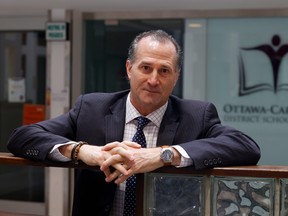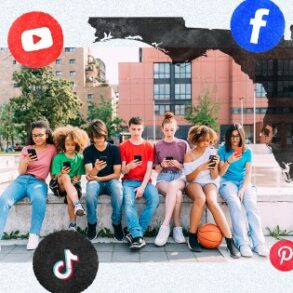Statements of claim were filed Wednesday by the Ottawa-Carleton District School Board, Toronto District School Board, Peel District School Board and Toronto Catholic District School Board.

Article content
The Ottawa-Carleton District School Board is one of four large Ontario school boards that filed lawsuits against social-media giants on Wednesday, claiming their products have harmed children and schools.
A 65-page statement of claim filed Wednesday in the Ontario Superior Court of Justice in Ottawa claims the parent companies and Canadian counterparts of Facebook, Instagram, Snapchat and TikTok are disrupting the way children think, behave and learn, leaving the school system to manage the fallout with limited resources.
Advertisement 2
Story continues below
Article content
Article content
Social media has been designed to lead to compulsive use and that compulsive use is causing massive strains on school board resources, including increased costs for mental health programming and staff, increased information technology costs and additional administrative costs, the statement of claim said.
The OCDSB is seeking $350 million in general and special damages, $100 million in aggravated damages and $350,000 in punitive and exemplary damages.
None of the claims have been proven in court.
The statement of claim called on the social-media companies to remediate the school boards and redesign their products to make them safe for children. “Students’ social media use is causing a student mental health crisis, for example, increased rates of anxiety, depression, social-media addiction, body dysphoria, anorexia, low self-esteem, disordered eating, self-harm and suicide.”
Social-media use has caused attention issues in the classroom and has been linked to cyberbullying and self-esteem issues in children, OCDSB director of education Pino Buffone said in an interview.
Advertisement 3
Story continues below
Article content
Whether it’s called addiction, habit formation or manipulation, children who use social media get rewards for using it and these behaviours are reinforced, he said. It was a problem even before the pandemic.
“I visit a school a week on average. Students are expressing social-media concerns. They’re aware of this. There is peer pressure and bullying. Staff are trying to manage this,” Buffone said. “I hear concerns from parents and guardians.”
The OCDSB is experiencing more frequent bomb threats, shooting threats, death threats or vague threats, such as a student taking and posting a photo with what appears to be a gun or weapon over social media, the statement of claim said.
The school board has been forced to divert resources to “proactively monitoring” social media for threats and staff must respond to threats that are outside work hours or on the weekend, said the statement of claim, which added that the board was also expending resources on responding to cyberbullying and harassment on social media.
The OCDSB is also the target of anonymous “confessional” accounts that target students or staff with false allegations and the board and its lawyers frequently contact social-media companies to request that content be removed, but frequently do not get responses, often resulting in follow-up actions and escalation, according to the statement of claim.
Advertisement 4
Story continues below
Article content
“The OCDSB and its student population has a right to be free from conduct that endangers health and safety,” it said.
If the case goes to court, lawyers for the school boards don’t have to prove that the social-media products are the sole cause of the harms to children, but that they are a “contributing cause,” said Duncan Embury, head of litigation at Toronto-based Neinstein LPP, which is handling the lawsuits on a contingency basis.
“The focus of this is meaningful change. Change takes many forms. Algorithmic designs, especially those that lead to problematic behaviour, need to change,” Embury said.
“Schools need help on the ground. Schools have finite resources. This is stretching that to the breaking point.”
Premier Doug Ford was asked about the school boards’ lawsuits while visiting Ottawa Thursday morning.
“I disagree with them,” he said, adding that the provincial government has already banned students from using cellphones in the classroom.
“Let’s focus on the core values of education. Let’s focus on math, reading and writing. That’s what we need to do and put all the resources into the kids,” he said.
Advertisement 5
Story continues below
Article content
“What are they spending on lawyer fees to go after these massive companies that have endless amounts of cash to fight these?”
The lawsuit claims that the social-media platforms gamify the use of their products, that they create a sense of urgency about using the product and promote content aimed at provoking an emotional reaction from users, whether it’s positive or negative.
“The defendants’ products are deliberately designed to manipulate the developing brain of students to promote excessive, compulsive and unsafe use of their products,” the statement of claim said.
“School-age children and adolescents are especially vulnerable to developing harmful behaviours because their pre-frontal cortex is not fully developed. Students tend to engage in reward seeking behaviour, tend to engage in upward social comparison, and engage is riskier behaviour than adults.”
In the United States, hundreds of school boards have already launched similar lawsuits. Educators in Ontario are aware of what is going in the U.S., Buffone said.
“As educators, we see the effects on the students,” he said. “It’s time to hold the social-media giants to account. ”
Advertisement 6
Story continues below
Article content
The primary goal of the lawsuit is to lead to the redesign of the software, Buffone said. It’s not the hardware, but the software programs and algorithms that lead to forming social-media habits, he said.
“We’re not saying social media is bad. We’re looking for its appropriate place. A cellphone can be used as a tool.”
The other Ontario boards that filed lawsuits on Wednesday were the Toronto District School Board, Peel District School Board and Toronto Catholic District School Board. The four lawsuits are a “mass tort proceeding,” which is used more frequently in the U.S., bundling together cases that have something in common, Embury said.
None of the U.S. cases have reached court yet, although some are in preliminary stages. “A lot of factors are coming forward,” Embury said. “The school boards are recognizing just the depth of the harm of these social media products.”
Last May, U.S. Surgeon General Dr. Vivek Murthy released an advisory on social media and youth mental health.
“Social-media use by young people is nearly universal, with up to 95 per cent of young people ages 13-17 reporting using a social-media platform and more than a third saying they use social media ‘almost constantly,’” the advisory said.
Advertisement 7
Story continues below
Article content
A spokesperson for Snap Inc., which produces SnapChat, an instant-messaging app in which photos and messages are only available for a short time, said its product was intentionally designed to be different from traditional social media, with a focus on helping users communicate with close friends.
“Snapchat opens directly to a camera — rather than a feed of content — and has no traditional public likes or comments,” the spokesperson wrote in a statement.
“While we always have more work to do, we feel good about the role Snapchat plays in helping close friends feel connected, happy and prepared as to face the many challenges of adolescence.”
Article content








Comments